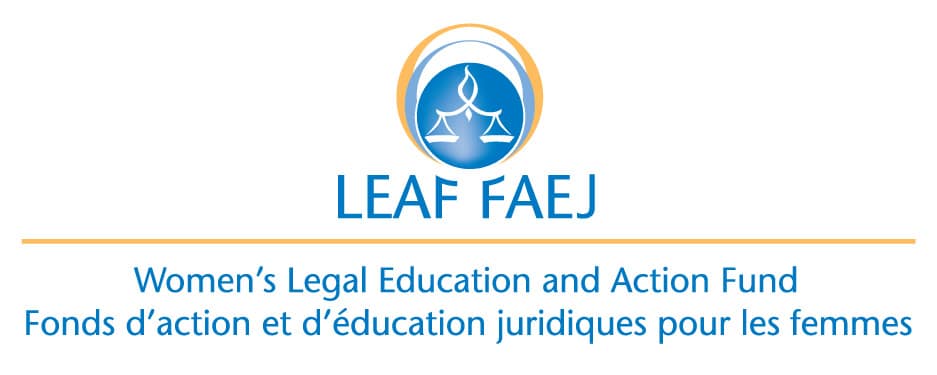The Women’s Legal Education and Action Fund (LEAF) together with Equal Pay Coalition and the New Brunswick Coalition for Pay Equity appear at the Supreme Court of Canada in two pay equity cases.
On Tuesday, October 31, 2017, LEAF, together with partners the Equal Pay Coalition and the New Brunswick Coalition for Pay Equity (the “Equality Coalition”), appeared at the Supreme Court of Canada in two pay equity cases, Attorney General of Québec v. Alliance du personnel professionnel et technique de la santé et des services sociaux, et al. and Centrale des syndicats du Québec, et al. v. Attorney General of Québec, et al, which will be heard together.
At issue in these cases is women’s access to pay equity in female-dominated workplaces such as childcare centres. The facta urge the Supreme Court of Canada to apply a robust equality analysis that recognizes how systemic discrimination structures women’s work, in order to advance women’s right to pay equity and financial equality.
Issues Under Appeal
Both cases involve provisions of the Quebec Pay Equity Act (the Act). In Centrale des syndicats du Québec, the Coalition is supporting a challenge to provisions that delay pay equity analyses and deny retroactive pay to women who work in female-dominated fields in which there is no male dominated job class, which perpetuates pay discrimination for those who experience it most significantly. In Alliance du personnel professionnel et technique de la santé et des services sociaux, the Coalition supports a challenge to provisions that require workplaces to review their pay scales to ensure pay equity only once every five years, with no back-pay obligations, unfairly limiting women’s equality rights to five year increments and denying women the right to a remedy for any breach.
The Intervention
LEAF and its co-intervenors argued that equal pay for work of equal value is a
fundamental human right that is crucial to women’s substantive equality. Systemic sex discrimination in pay results from the application over time of wage policies and practices that have tended to ignore, or to undervalue, work typically performed by women. This has created a labour market characterized by sex-segregated occupations and devaluation of the work that women do. This discrimination reinforces itself, as the more women dominate in a job, the lower it is paid. Further, the more women are marginalized by intersecting discrimination based on being Indigenous, and based on race, immigration status, disability, sexual orientation and gender identity, the deeper pay discrimination they face. Accordingly, sex discrimination in pay causes women’s ongoing material inequality.
In Centrale des syndicats du Québec, et al. v. Attorney General of Quebec, et al, the Coalition argued that, as a result of this sex segregation in the workplace, provisions that require a direct male comparator in the workplace for the purposes of receiving retroactive pay disadvantages women who experience pay inequity most severely. The impugned law distributes women’s rights based on the presence or absence of male- dominated job classes in the workforce, rendering women’s proximity to male work environments the determining factor for whether women are entitled to a remedy for
sex discrimination. This reinforces the disadvantage of women working in female dominated industries, which remain chronically underpaid relative to male dominated industries. The result of the provisions at issue is that the more that women have suffered from systemic sex discrimination that results in deeply segregated occupations, a deeply sex-segregated labour market, and deep devaluation of women’s work, the less they are entitled to remedies for systemic sex discrimination.
In Attorney General of Québec v. Alliance du personnel professionnel et technique de la santé et des services sociaux, et al., the Coalition challenged provisions in the Act that eliminate employer’s obligations to monitor workplace changes in real time to prevent and rectify discrimination. Pay equity is the product of systemic discrimination, and deeply rooted biases and prejudice. It therefore takes active intervention to maintain equality in the face of systemic discrimination, as without conscious effort, systemic patterns of discrimination re-emerge. It is therefore crucial to require ongoing pay equity monitoring. The incremental approach allowed under the Act allows Employer’s to avoid their equality obligations during the interim five-year period with no consequences. This is inconsistent with the ongoing and permanent nature of human rights. The episodic and incomplete protection fails to treat pay equity as a normal and legitimate part of workplace rights and it fails to build women’s equality into core workplace standards. Further, the provisions require no back pay for the intervening periods of pay inequity, in between reviews, which effectively denies women any remedy for the ongoing sex discrimination permitted under this Act.
LEAF and its co-interveners argued that these provisions violate section 15, as they all perpetuate women’s economic inequality and pre-existing disadvantage, rooted in historic and continuing systemic discrimination.
LEAF is grateful to counsel Fay Faraday of Faraday Law and Jan Borowy of Cavalluzzo LLP for their representation in this case. It is also grateful to the Ontario Federation of Labour for generously funding this intervention.
The factum for Attorney General of Québec v. Alliance du personnel professionnel et technique de la santé et des services sociaux, et al. is available here, and the factum for Centrale des syndicats du Québec, et al. v. Attorney General of Québec, et al. is available here.

